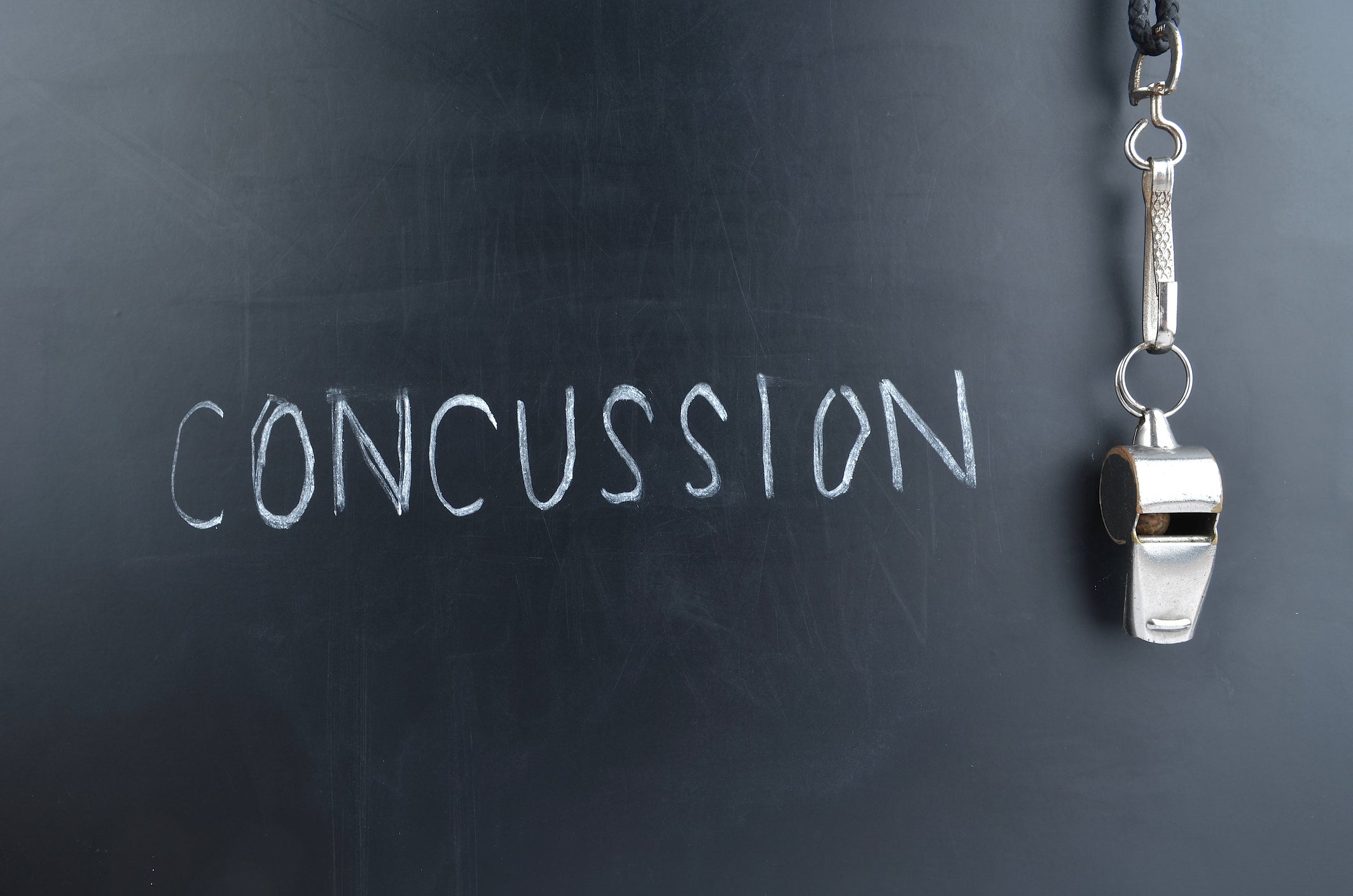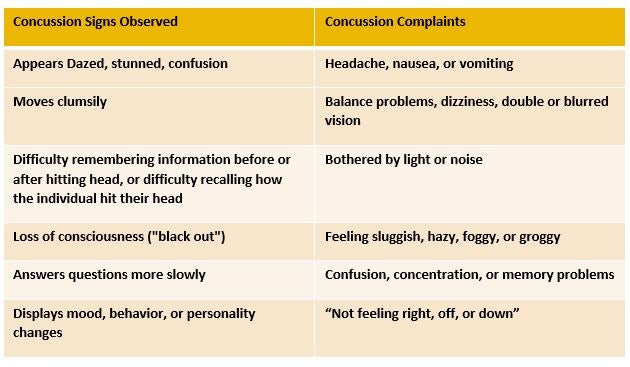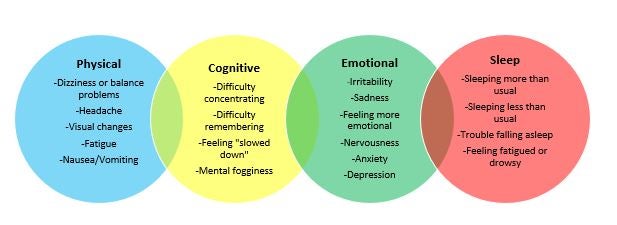Concussion 101
October 6, 2022
By: Logan Kaleta, PsyD, CIC and Fernando Manalac, MD
Categories: Sports Medicine
What You Need to Know About Concussions
Given the seriousness of the recent concussive injuries sustained in the NFL, we wanted to provide some answers and education regarding these injuries:
What is a concussion?
A concussion is a mild Traumatic Brain Injury (mTBI) that temporarily disrupts how the brain normally works. As defined by the Centers for Disease Control and Prevention (CDC), a concussion is caused by a bump, blow, or jolt to the head or by a hit to the body that causes the head and brain to move rapidly back and forth. This sudden movement can cause the brain to bounce around or twist in the skull, creating chemical changes in the brain and sometimes stretching and damaging brain cells. Thus, referred to as the energy crisis the brain experiences following the injury.
Concussions are typically described as a functional brain injury versus a structural brain injury. There is typically no bleeding or skull fracture, which is why neuroimaging is not typically done or recommended following the injury. Thus, concussions are thought of as clinically diagnosed and summarized by the brain injury occurs more at a cellular level.
Can my son/daughter or I sustain a concussion like what I saw on TV?
Yes. Anyone, regardless if they are playing contact sports, riding a bicycle, walking, or a simple fall can result in an injury similar to the injuries seen while playing football these past 2 weeks.
Do I have to "black out" or lose consciousness to be diagnosed with a concussion?
No. Most concussions occur without a loss of consciousness.
Should I keep playing through feeling different after hitting my head?
Unequivocally NO. Continued play after hitting your head puts you at significant risk for hitting your head again, and can result in more significant issues, lengthened recovery time, poorer functioning, and possible long term consequences. Moreover, you may be more impacted in school, work, or other domains of your life, which can further result in negative consequences.
Even if the head injury is not determined to be a concussion, that is a better consequence that will result in quicker return to play and maintenance of normal functioning, versus playing through a possible concussion and dealing with the previously stated negative consequences.
What do I do if I "feel off/out of it" or any symptoms that make me believe a concussion may have occurred?
Remove yourself from play immediately. Tell your coach and/or team athletic trainer so that you can be further evaluated.
How do I know the severity of a concussion?
We no longer grade a concussion; however, we utilize a comprehensive assessment to further examine an individual's functioning and possible areas that may be impaired. Following that assessment, we can further determine what interventions may be needed to restore functioning and safely return the athlete to play.
What are the observable signs and complaints from a concussion?

What are the symptoms of a concussion?
In general, everyone’s concussive injury is unique and can depend on different factors. The first step is recognizing different symptoms for a suspected concussion, which may include:

For further information, or if you believe an individual either did/may have sustained a concussion, please call the Holy Cross Concussion Clinic Hotline at (954) 542 – 4285 to discuss the symptoms of that individual and to schedule an appointment to be evaluated by our multidisciplinary team.
A Physician’s Perspective
Certainly watching the recent hits Tua Tagovailoa, the Miami Dolphins QB1, has taken this football season has been difficult to watch. Understandably, the management of his injuries have provoked strong feelings in the sports community. Regardless of if the situation was handled optimally or appropriately, the events highlight important issues in concussion in sports.
Concussion Diagnostics
Currently, we are limited by the objective testing that exists to evaluate concussion. There is no CT scan, X-ray or MRI that a doctor can use to diagnose a concussion. This is a cellular brain injury, not a structural injury. Much of the objective testing we have is based on subjective information given by the athlete. However, when put together in combination, the tests and surveys are highly sensitive at diagnosing concussive injury. Still, we await new technologies and research, including neuroimaging and blood/saliva markers to help us identify and manage concussion.
Concussion Can Be Career Threatening
There have been a number of athletes that have had their careers cut short by repetitive concussive injury and/or Post-Concussive Syndrome (PCS). This list includes (but not limited to):
- Ali Marpet – NFL Linebacker, Tampa Bay Buccanneers, retired age 28
- Adam Deadmarsh – NHL Forward, Los Angeles Kings, retired age 30
- Luke Kuechly – NFL Linebacker, Carolina Pamthers, retired age 28
- Ryan Miller – NFL Offensive Lineman, Denver Broncos, retired age 26
- Ellie Furneaux – Olympic Bobsled/Skeleton, Team Great Britain, retired age 24
- Josephine Pucci – Olympic Women’s Ice Hockey, Team USA, retired age 23
- Sean Morey – NFL Wide Receiver, Seattle Seahawks, retired age 33
- Tory Nyhaug – BMX Olympic Racing, Team Canada, retired age 27
I remind my patients daily, that although concussion is a mild Traumatic Brain Injury (mTBI), it must be treated seriously, as one, or multiple injuries, can end an athletic career. In addition, having one concussive injury is a risk factor for having another. Therefore, not only do we need to focus on diagnosis and treatment of concussive injuries, we must also place high importance on PREVENTION.
Concussion Prevention
Much like other aspects surrounding concussive injuries, more research needs to be done in the area of prevention. However, there is data suggesting that preventive strategies should include:
- Neck Muscle Strengthening Program
- Reaction Time/Processing Speed Optimization
- Proper Equipment Fitting
Game Management
Most leagues have incorporated some changes in how concussions may be prevented or monitored. Youth soccer leagues have changed the rules and regulations, such as banning heading in soccer. Other youth leagues have changed their policies to avoid multiple games in one day or many games in a weekend to avoid fatigue, a time when athletes are most vulnerable to concussive injury. Professional leagues, such as the NFL have placed spotters in the stadium to identify possible concussive injury. I believe new technologies will also allow us to better monitor concussion.
